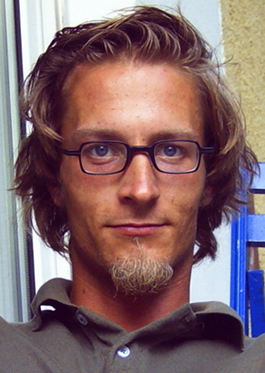Max Orlich
Friendship and theory production The entanglement of intellectual friendship with the theoretical concepts in the Situationist International
Personal information
Date of birth: 5th of Mai 1979 in Freiburg, GermanyeMail: max.orlich@grk-freundschaft.uni-freiburg.de
Education
- 1998: High School Diploma (Abitur) at Friedrich-Gymnasium Freiburg
- 1999 - 2006: Studies of Sociology and Political Science at the Albert-Ludwigs-University Freiburg
- June 2006: Magister Artium with a Master‘s Thesis, that was supervised by Prof. Dr. Wolfgang Eßbach, with the title “Keep abreast of reality. Theory and methods of the Situationist International.“
Occupations
- October 2001 - February 2006: assistant/tutor of Prof Dr. Baldo Blinkert at the Institute of Sociology
- October 2003 - February 2004: assistant/tutor of Prof Dr. Axel T. Paul at the Institute of Sociology
- October 2004 - February 2005: assistant/tutor of Prof. Dr. Wolfgang Eßbach at the Institute of Sociology
- Since June 2006: DFG-scholar at the PhD research group (Graduiertenkolleg 1288) "Friends, Patrons, Clients. Practice and semantics of friendship and patronage in historical, anthropological and culture-comparing perspectives"
Focus of interest
- Sociology of arts and culture: Avant-garde in the 20th century, sound-image-relations as well as music- and culture-industry; Sociology of intellectuals: interconnection and mental patronage among intellectuals and artists; French literature in the sphere of the group “OuLiPo”; Media-Theory.
PhD Thesis Project
Supervisor: Prof. Dr. Wolfgang Essbach
Tutor: Prof. Dr. Hans-Helmuth Gander
The core of this thesis deals with the investigation of the entanglement of group identity/group dynamics and the theory production in the Situationist International (SI) - a group of different artists which existed and produced from 1958 to 1972. The question concerning the alternating influence between friendship, patronage and competition on the one hand and theoretical approaches on the other hand has been worked on in the fields of other avant-garde artists such as Dada and Surrealism and therefore is recognized as a relevant factor for the investigation of diverse artistic groups already. By contrast for the SI, where the group dynamics as well as the theoretical concepts show such a particularity, that you can suppose a connection between these two aspects, such a inquiry is lacking thus far.
While the connection between group dynamics and theory production is mostly apprehended as such, that the first affect the latter, with regard to the SI it can be assumed, that there is also the reverse influence. That means that one could use the theoretical concepts to explain the group dynamics. On this basis there are two questions to be investigated:
- Which connections can be drawn between group dynamics and theoretical concepts in both possible directions of impact?
- In how far do the leavings and exclusions, which might be caused by the theoretical concepts, affect the relations of friendship, patronage and competition which underlie the structure of the group?
The analysis of the methodical and theoretical concepts of the SI, that I´ve developed in my Master´s thesis forms the starting point for the first topic. Regarding the question about the effect on the group structure it is especially relevant to take into account on the one hand the concept of the moment-like, which is included in the construction of situations as well as in the détournement and on the other hand the dealing with the problem of récupération. Both of them could offer an explanation for the high fluctuation of members. Moreover one has to consider - by turning around the line of thought - in which way the leavings and exclusions of formerly important members change the theoretical approaches. The most significant effects of the members´ structure on the theoretical level should be worked out in the sphere of the question concerning the revolutionary function of art as well as - regarding to the situationist concept of the spectacle - in the sphere of the question on the proportion between totality and separation.
The second topic focuses on individual relations of friendship, competition and patronage within the SI and tries to clarify, if and in what scope relations alter due to leavings and exclusions of one of the persons involved. To come from Guy Debord as the central figure of the SI there are four relationships to be investigated: firstly the one to the painter Asger Jorn, secondly the one to the architect Constant, thirdly the one to the theorist Raul Vaneigem and forthly the one to the artists of the Gruppe SPUR. According to this selection of relationships within the SI it is possible to outline the different constellations of friendship, competition and patronage as well as their changes and repercussions.
Seen as a whole this thesis wants to make an attempt to elaborate the importance and functioning of the SI as an avant-garde group and to make a contribution to encourage and to systematize the research on this matter in Germany. This should always be undertaken in consideration of the french research regarding the SI to make use of the chances offered by an international cooperation in addition to the opportunities already given by an interdisciplinary approach. For such a purpose to sharpen the comparative eye on particular social phenomenons the SI is especially suitable, because it is - even if based in France - an international group that has also been present in Germany for some time by means of the Gruppe SPUR.

